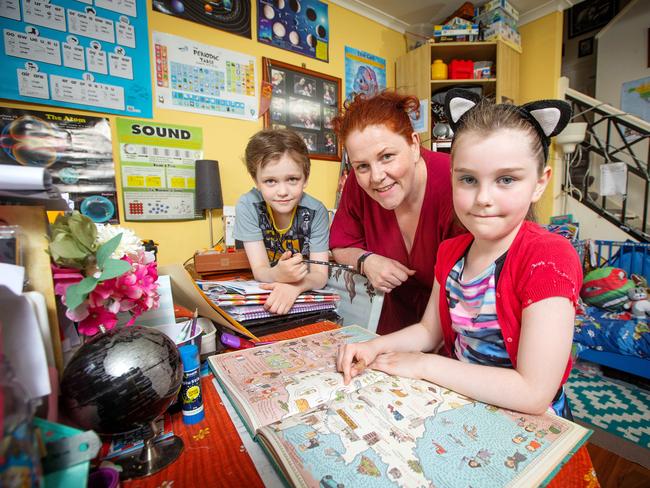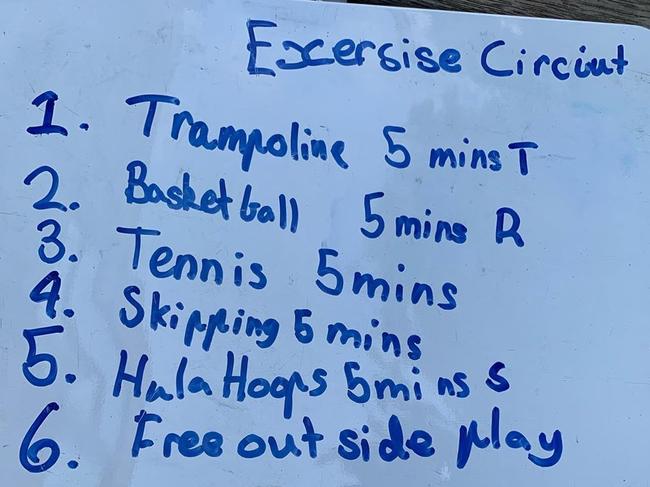Coronavirus: Top tips for homeschooling children during Australia’s lockdown
Parents across Australia are now educating their children at home with no end date. And many, like comedian Dave Hughes, are learning how to navigate the new normal. Here’s what you need to know. TOP TIPS

Hibernation
Don't miss out on the headlines from Hibernation. Followed categories will be added to My News.
Ditch the worksheets, embrace hands-on learning, and don’t get hung up on routines or recreating school at home.
That’s the advice from experienced homeschooler Allison Young as parents en masse face the prospect of educating their children at home with no end date.
Ms Young, from Brunswick in Melbourne, is in her fourth year of homeschooling with son Rune, 10, and daughter Lexie, 8.
It was a path she took initially for health reasons, after Rune lost 121 days in grade 1 because of complications for asthma. But she’s never looked back.
“We fell in love with it and realised it really worked,” she says.
“It grew from health reasons, to, no, I actually feel they’re getting a better education now.”

Ms Young advises parents thrust into the world of homeschooling by the COVID-19 pandemic to begin by taking a deep breath.
“Don’t panic. Don’t overwhelm yourself or your child,” she says.
“When you send your child to school, they’re actually only learning for about two to three hours by the time you take into account lunch, recess, walking to and from different classes, chatter in the class, all of that stuff.
“Get this eight hours of having to do school out of your head.”
Ms Young has set up a simple learning area, separate from the children’s bedrooms, free from toys, with a desk and books.
While routines will work for some, Ms Young advises parents to break down learning into small chunks and embrace unstructured learning opportunities.
“You can bake a cake, and you’re learning about volume, measurement, fractions, and there’s your maths and science lesson,” she says.
“It’s OK to do 20 minutes on maths, 20 minutes on English. It’s quality over quantity.
“A lot of children respond better to having you present. You can’t just necessarily throw a worksheet at them and say go and do that, but at the same time you don’t have to hover them.”

But Ms Young, who fits her kids’ learning around a home crafting business, AllyBeeDesigns, says parents can give children tasks to do independently.
“We are reading The BFG, so we’ll read a chapter, then discuss it. And then both are right now sitting at their desks, writing what happened and answering some basic questions.
“And let’s say they want to watch a movie, I’ll get Rune to write an opinion piece on why they should be allowed to watch the movie, and Lex to write why they shouldn’t.”
The Home Education Network offers excellent advice for Australian parents suddenly educating kids at home.
The network’s assistant co-ordinator, Kirsty James, urges parents to be kind to themselves.
“This is an unprecedented situation – none of us are prepared for it,” she says.
“It’s just like parenting – there’s no one right way.”
HOW HUGHESY’S FAMILY IS COPING WITH HOMESCHOOLING
When Sadie Hughes found out she was going into lockdown, the eight-year-old was quick to draw up a homeschool schedule and exercise program for the whole family – and they’re sticking to it.
The middle child of radio personality Dave Hughes and schoolteacher Holly, Sadie’s day starts at 6am and includes ‘fun time’ of Lego, drawing, craft and baking, as well as reading, writing, puzzles and ‘skill time’ – an hour dedicated to juggling, doing the splits and learning the alphabet backwards.

“But I miss school, I love school,” Sadie told HiberNation in the middle of her maths homework.
“I like all subjects – Mum said can we start later than 9am, and I said no.
“The worst thing about holidays is there is no school – I can’t wait to go back.”
Hughesy, who is doing his radio show from home in quarantine, said they were trying to navigate their new normal, just like everyone else.
“It’s very strange - it’s a very strange time to be alive there is no doubt about it,” he said.
“One good thing is we are all experiencing the same things so hopefully it brings people closer together.
“You talk to people on the street you don’t know and you have a lot to talk about.”

He said as soon as Sadie knew schools were being closed in Victoria, she got out her pen and wrote out the family timetable. Her exercise circuit includes five minutes on the trampoline, basketball, skipping, hula hoops and everyone’s favourite – free time when it’s all finished.
“My wife actually said luckily they get along so well, but we are only a few days in, so Lord knows what it will be like soon,” he said.
“We just watched The Swiss Family Robinson on Netflix about the family who got shipwrecked on an island, and are all feeling a bit Swiss Family Robinson.
“But we are being relaxed about it all – shooting for the stars and we may end up on the moon.
“Sadie does cartwheels 24/7 anyway, so the hardest part is getting her to stop long enough to watch a movie.
“And my son is connected through playing Fortnite – he would be happy to stay in his bunker for the next two years – gamers have been preparing for this for the last 10 years,” he joked. “I’ve got friends who have been long term unemployed and I was like ‘mate this is your time to shine’.
“But we are certainly living through interesting times.
“It’s quite bizarre.”
TOP TIPS FOR HOME SCHOOLING
If your school provides work to complete, spread it over the day with breaks to eat, phone friends and pursue hobbies. You don’t have to replicate school – some families find a routine works, but others ditch set hours and timetables.
PRACTICAL: Hands-on learning is easier to facilitate at home – use measuring jugs to learn fractions; write a collaborative story with friends; find inexpensive science experiments online.
ACTIVE: Keep kids active with backyard play, walks, bike rides, table tennis, totem tennis, trampolines, roller blades, workout DVDs or yoga to stop them going stir crazy.
EXPLORE: Online gaming options such as Minecraft and Terraria allow kids to chat online while they play together.
TOOLS: Use tools such as Zoom for online group gatherings.
MOTIVATE: Encourage kids to want to learn, try “strewing” – leaving a variety of educational options around the house to pick up and run with.
MODELLING is very effective – if a parent is sewing, watching a documentary or planting a vegetable garden, kids will want to join in.
FOCUS on the positives – being less busy can be a blessing, if we allow it to be.
Source: Home Education Network
More: home-ed.vic.edu.au
